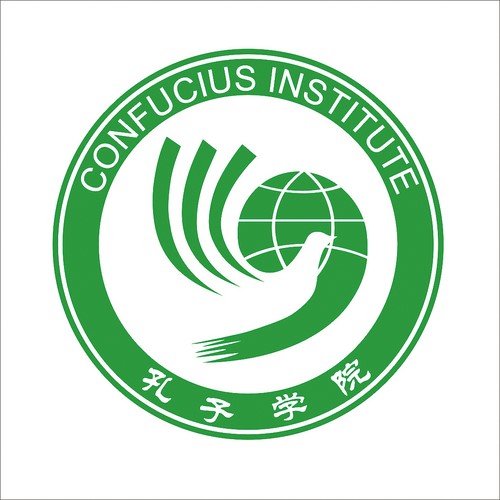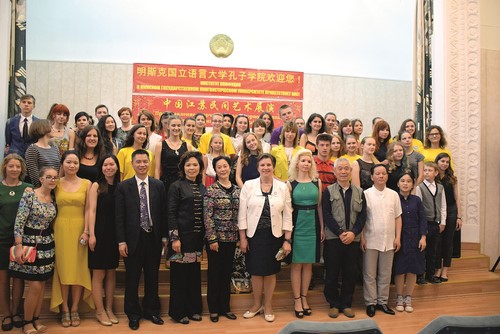Few can be now surprised by Belarusians’ keen interest in China and their desire to learn Chinese. Truly, the study of Chinese expands our citizens’ cultural-educational horizons, while contributing to their self-esteem and career growth. Moreover, it’s prestigious: Chinese is one of the six official languages of the United Nations and, in coming decades, may become the second most popular language after English. According to statistics, one in five people in the world speak Chinese. Moreover, as those who understand the language admit, Chinese is utterly fascinating to learn.
We here chat with the Director of the Confucius Institute, at Minsk State Linguistic University, the Director of the MSLU’s Institute of Qualification Enhancement and Staff Retraining, Candidate of Pedagogical Sciences Larisa Trigubova. In December 2015, she was awarded the Hanban Individual Performance Excellence Award in recognition of her ‘outstanding and invaluable service to the Confucius Institute’.

Larisa, do you communicate with those who study Chinese at the Confucius Institute? What can you say about them?
I respect people who are not only interested in the Chinese language but who actively take up its study. Chinese — with its hieroglyphic system — is successfully mastered by those who love to learn, and who are highly motivated, wishing to make practical use of the language. Passion encourages students at the Confucius Institute to study hard, to better understand the unique culture of China. This interest often takes students towards Chinese language courses. I’m very pleased to see the enthusiasm of students in the classroom: people of different ages jointly learn Chinese tones, write hieroglyphs and sing songs. At the end of each school year, all groups at the Confucius Institute demonstrate their achievements and talents at a final concert, arousing admiration and delight among their relatives, friends and the public.
From where does your interest in China originate?
When, in September 2011, the Confucius Institute at our University was established, I became a member of the Board as the Director of the Institute of Qualification Enhancement and Staff Retraining and, a month later, was appointed as Confucius Institute Director. As a result, I had the opportunity (and need) to study and understand Chinese, to help disseminate Chinese language and culture in Minsk and Belarus.
How was the Confucius Institute at the MSLU established?
The Confucius Institutes is an international network of cultural and educational centres set up by the State Chancellery for the Spread the Chinese Language Abroad (Hanban), across leading educational institutions worldwide. The first Confucius Institute was established in 2004 and there are over 500 globally.
Hanban’s opening of the Confucius Institute at Minsk State Linguistic University shows recognition of its achievements in teaching foreign languages and, in particular, Chinese.
Not only this. It also shows a great deal of trust. The Southeast University in Nanjing, which is one of China`s major universities, has become our Chinese university-partner, developing the MSLU’s Confucius Institute. On September 18th, 2011, we organised the opening ceremony of the Confucius Institute at Minsk State Linguistic University. Present was the Chairman of the Standing Committee of the National People’s Congress, a member of the Standing Committee of the Political Bureau of the CPC Central Committee, Wu Bangguo, alongside Hanban heads, members of the Chinese Embassy to the Republic of Belarus, and representatives from the Ministry of Education of Belarus.

Some time later, the Confucius Institute was recognised as one of the best in the world. Tell us more…
Minsk State Linguistic University is our leading linguistic university; the establishment of the Confucius Institute offers residents of Minsk, and students of schools and universities not studying Chinese as a ‘major’, high-quality courses to learn Chinese. It also helps promote the development of Chinese language teaching in Belarus and establishes contacts at various levels. Clearly, this deepens friendly relations between Belarus and China.
In 2013, our Confucius Institute was awarded the title of the ‘Best Confucius Institute of the Year’ among the 28 Confucius Institutes worldwide. After the opening, we began to promote the spread of Chinese language. In February 2012, we accepted the first group of students to our Chinese language courses and, every year, the number grows.
What else do you do to draw attention to Chinese culture?
We widely celebrate Chinese festivals, with the participation of students from the Confucius Institute and from Minsk State Linguistic University, as well as Minsk residents. We organise tea parties, exhibitions of folk works, photo exhibitions, Tai Chi classes, days of Chinese cuisine, and master classes in calligraphy and traditional Chinese art...
Lectures by Chinese specialists in linguistics and literature are proving popular, as are exhibitions of artworks by famous Chinese artists and calligraphers. Concerts by Chinese folk groups are also well attended.
The Confucius Institute is already part of our university and, with great support from our rectorate, we’re cooperating with all departments and divisions. I’m delighted to note that our Chinese teachers and Belarusian employees work together, leading us towards success and recognition. Our 15-minute film about the Confucius Institute, shot in 2014, is well received: ‘On the Path to Success’.
What are the main activities of the Confucius Institute at present?
Firstly, the Confucius Institute organises training courses in spoken Chinese — for pupils, students and specialists with higher education. Especially popular are our training courses for international exams in Chinese: HSK and HSKK. Over 800 people study Chinese at the Confucius Institute and across another ten educational establishments, in Minsk, Grodno, Mogilev, and Molodechno.
The main advantage of Confucius Institute courses at Minsk State Linguistic University is that teaching is offered by native speakers: teachers from China sent to us by Hanban. We also use Hanban’s educational resources. On May 31st, we launched the Confucius classroom as a branch of our Institute, at Grodno’s V. Karsky gymnasium #1. In November, we plan to open a similar classroom, at Mogilev’s gymnasium #3. In September 2016, Chinese language courses were introduced at Volozhin’s gymnasium #1. As you can see, the Confucius Institute is contributing to the strengthening of the Chinese language’s position within the Belarusian educational system.
The Confucius Institute at Minsk State Linguistic University takes care of methodical training of Chinese teacher-volunteers and teachers of Chinese from Belarusian schools, universities and gymnasiums. It organises consultations, round table discussions, thematic seminars and linguistic and methodological practical studies.
In February 2015, we opened the Centre of Chinese Language and Culture, at the MSLU student dormitory, at 97 Dzerzhinsky Avenue. We’ve had support from the Chairperson of the Confucius Institute’s Board, MSLU Rector Natalia Baranova. Its specially equipped rooms — Great Chinese Wall, Panda and Bamboo — offer cultural events free of charge to anyone interested in Chinese folk traditions and holidays, and in various aspects of modern China, including music, youth fashion, cinema and literature.

The Confucius Institute also organises biannual international exams in Chinese: HSK and HSKK. Since 2012, around 1,300 people have taken these certificates, which entitle students to apply for Hanban scholarships, to study at Chinese universities for a semester or a year. Over five years of operation, more than 130 University students have been sent to Chinese universities under such scholarships, of the Main Directorate of Hanban Confucius Institutes.
Since 2012, a hundred Confucius Institute students have taken part in a two-week summer camp at the Southeast University in Nanjing (our Chinese partner university) studying the language and gaining acquaintance with Chinese culture.
Professional contacts, established during Chinese specialists’ visits organised by the Confucius Institute, aid cooperation between Belarusians and Chinese people, including in the sphere of medicine. What was most interesting at the recent Belarusian-Chinese Medical Forum, held in Minsk?
It was attended by around 170 Belarusian specialists in traditional Chinese medicine, endocrinology and oncology, who were able to enrich their knowledge, learning from Zhongda Hospital specialists, who travelled from the Nanjing Southeast University. They could evaluate their professional skills. The forum was organised jointly with the Health Department of Minsk City Executive Committee and the 10th Minsk City Clinical Hospital.
Why do you think Belarus is inte-resting to China?
I recently asked my colleague this question. The Director of the Confucius Institute on the Chinese side, Professor Keqi Xu, of the Southeast University in Nanjing, told me, “As Confucius said, it’s a pleasure to make friends from afar. Although Belarus and China are geographically distant, our countries have much in common regarding their philosophy, their attitude towards life and the relationships of people. This may explain the strong strategic and political relations between our two countries.”
China is interested in Belarus for at least two reasons. On one hand, Belarus is a beautiful country, with wonderful forests and well-preserved nature. Chinese people come to Belarus to enjoy its beauty. In addition, Belarusians are very polite and hospitable, as well as being eager to learn. Belarus has well-developed science, art and literature, which attracts Chinese students to study here. Secondly, our two countries are working closely in the international arena. China is now implementing the ‘One Belt One Way’ project and Belarus has become an important strategic partner in its realisation. Development of the Great Stone Belarusian-Chinese Industrial Park brings benefit to both countries.
How are you going to celebrate the fifth anniversary of the Confucius Institute?
We’re planning a series of events: a gala evening at the University, with the participation of representatives of educational institutions at which Confucius Institute teachers work; master classes in Tai Chi and calligraphy; a photo exhibition of books; contests; thematic round table discussions; artistic workshops; and media presentations.
Let’s congratulate all those directly related to the Confucius Institute on the forthcoming jubilee, wishing you all further success on the path to mastering Chinese culture.











